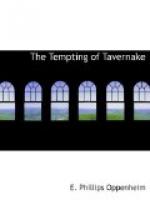The professor raised his glass with shaking fingers.
“Elizabeth knows what is best,” he declared, “I am sure that Elizabeth knows what is best, but I, too, am beginning to wish that she would go away. Last night we met him at Walter Crease’s.”
Once more he turned a little nervously towards Tavernake, who was looking down into the body of the restaurant with immovable face.
“We tried to persuade him then to go away. He is really in rather a dangerous position here. Jimmy Post has sworn that he will not be taken back to New York, and there are one or two others—a pretty desperate crew. We tried last night to reason with Pritchard.”
“It was no good?” she whispered.
“No good at all,” the professor answered, drily. “Perhaps, if we had not been interrupted, we might have convinced him.”
“Tell me about it,” she begged.
The professor shook his head. Tavernake still had that air of paying no attention whatever to their conversation.
“It is not for you to know about, my dear,” he concluded. “You have chosen very wisely to keep out of these matters. Elizabeth has such wonderful courage. My own nerve, I regret to say, is not quite what it was. Waiter, I will take a liqueur of the old brandy in a large glass.”
The brandy was brought, but the professor seemed haunted by memories and his spirits never wholly returned. Not until the lights were turned down and Tavernake had paid the bill, did he partially recover his former manner.
“Dear child,” he said, as they stood up together, “I cannot tell you what the pleasure has been of this brief reunion.”
She rested her fingers upon his shoulders and looked up into his face.
“Father,” she begged, softly, “come to me. I can keep you, if you don’t mind for a short time being poor. You shall have all my salary except just enough for my clothes, and anything will do for me to wear. I will try so hard to make you comfortable.”
He looked at her with an air of offended dignity.
“My child,” he replied, “you must not talk to me like that. If I did not feel that my duty lay with Elizabeth, I should insist upon your coming to me, and under those conditions it would be I who should provide, not you. But for the moment I cannot leave your elder sister altogether. She needs me.”
Beatrice turned away a little sadly. They all three descended the stairs.
“I shall leave our young friend, Mr. Tavernake, to escort you to your home,” the professor announced. “I myself shall telephone to see if Elizabeth has returned. If she is still away, I shall spend an hour or two, I think, with my friends at the Blue Room Club. Beatrice, this has been a joy to me, a joy soon, I hope, to be repeated.”
He took both her hands. She smiled at him with an attempt at cheerfulness.
“Good-night, father!” she said.




